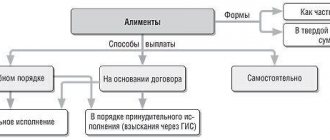Each parent actually has child support obligations from the moment the child is born. But as long as the father and mother regularly fulfill their parental duties, they do not need to consider this issue.
The situation changes later when one of them forgets about the responsibility to support the child. And in this situation, the other parent has the right to start filing child support. But it is important to do this correctly, choosing the most optimal method and the desired sequence.
In what cases is a child entitled to child support?
For example, the mother of a child born:
- outside of marriage (if only the father recognizes him and agrees to enter his name on the birth certificate, or the court will do this for him based on the results of establishing family ties);
- within 300 days after divorce;
- married;
- other parents, but adopted with a spouse during marriage;
- from a man who was subsequently deprived of parental rights.
A father can be removed from the duties of supporting minor children only in one case - if his paternity has been challenged in court. This can be done only after the birth of the child, and amounts paid up to that time are not subject to refund.
Child support is also due to adult children:
Articles on the topic (click to view)
- What to do legally if a mother does not pay child support
- Legal assistance to orphans
- Fixed child support under the new 2020 law if the father works
- Form of agreement on payment of alimony for a minor child: sample 2020
- Conditions and documents for obtaining a land plot for a third child in 2020 in Moscow
- Conditions for receiving and amount of maternity capital for a second child after 2020
- Federal Law 159 on additional guarantees for social support for orphans
- disabled people since childhood;
- those who have lost their ability to work.
Can parents enter into an agreement on child support if the marriage is not registered?
A child has the legal right to receive maintenance from both parents, regardless of whether they are legally married or whether the child was born into such a marriage.
Both parents must equally bear all costs of raising the child. Moreover, both parents must communicate with the child and participate in his upbringing and development.
Consequently, the child’s parents who are not in an officially registered marriage have the right to enter into a notarial agreement on child support among themselves. Also, alimony for such children can be assigned through the court.
Who can initiate
A minor personally does not have the right to apply for alimony (apply to the authorized government agency), since his civil legal capacity is limited by law. A legal representative will act on his behalf:
- Father or mother (depending on which of them evades child support).
- Guardian (on behalf of a ward under 14 years of age).
- Guardian (for the benefit of a child from 14 to 18 years old).
As for an adult disabled child, he can apply for alimony himself, but only if he has full legal capacity. For those who have been deprived or limited by the court, legally significant actions will be performed by an appointed guardian or trustee.
Can a father file for child support for the child's mother?
In the overwhelming majority of cases, child support payments, of course, are assigned from fathers to mothers (in 80% of cases), however, situations periodically arise when it is the father who takes upon himself the burden of raising and maintaining the child - and, therefore, at the same time receives the right to collect alimony from the mother .
If the child lives with his father, the procedure for filing a claim in the magistrate’s court will differ from that previously described only in that:
- the plaintiff in this situation will be the father, the defendant - the mother;
- the father will need to provide compelling evidence of the mother’s negative behavior and her lack of participation not only in the material side of the child’s life, but also her reluctance to raise him in general;
- The court also collects payment of the state fee from the mother (that is, from the defendant).
Alimony to the father is paid in the same amount as if it were assigned in favor of the mother, and is also determined depending on the number of joint children.
What does a child have a right to expect?
The law establishes a minimum threshold for the maintenance of a minor - an amount that should be enough to cover his basic needs. It is determined by two methods:
- proportional to the payer’s income (shared recovery);
- based on the cost of living and the needs of the recipient (fixed amount).
The amount of alimony in the share ratio is:
- 1/4 of the parent’s income for one child;
- 1/3 - for two;
- 1/2 - for three children or more.
If the sources and amount of income of the alimony provider cannot be determined with accuracy, or the recipient is an adult disabled child, the amount of monetary support is assigned in the form of a fixed payment.
When determining the fixed amount, the following are taken into account:
- financial situation of the payer and recipient;
- living wage established for a given region;
- presence of additional obligations of the alimony provider;
- health status of parents and child.
Amount of alimony
When drawing up an agreement, it is important to know that the law provides for the minimum amount of alimony that can be assigned under the agreement. So, if the payer has one child, then this child has the right to count on receiving 25% of all income he receives. If the payer has two children, then they together have the right to support in the amount of 1/3 of the payer’s income. And three or more children can deprive their parent of half of all his income.
If the parents in their agreement have specified the amount of alimony that is lower than specified, then the notary may refuse to certify such an agreement. This document may also be annulled by the court as invalid.
Design methods
You can obtain financial assistance from a parent in a forced or voluntary-compulsory manner - through the court or by concluding an agreement on the payment of alimony.
The first thing you should try is an out-of-court registration method. It is possible under the following conditions:
- Both the payer and the recipient are able to find a compromise and agree on the amount and procedure for paying alimony.
- Both parties to the agreement are fully capable.
- The essence of the agreement does not contradict the legitimate interests of the recipient and the payer.
- Parents (representatives, etc.) have the opportunity to visit a notary in person or through intermediaries to certify the transaction.
The advantage of out-of-court settlement is the absence of a dispute and the difficulties associated with its resolution, and also that the terms of the contract should become more acceptable to the parties, since they were drawn up by them themselves.
A disadvantage may be the cost of certifying the agreement - Moscow notaries charge about 8 thousand rubles for this service.
Both executive documents - an agreement on the payment of alimony and a judicial act - have equal legal force and can become the basis for the forced collection of funds through bailiffs.
How is alimony paid in practice?
The procedure for paying alimony depends on the method of its assignment.
- With an oral agreement and a written agreement - within a time frame and in a manner that suits both parties.
- In case of receiving a court order or decision - through the accounting department of the enterprise where the obligated person works, or through the executive services.
If the payment will be made through the place of employment of the alimony payer, then the funds must be transferred within 3 days from the date of payment of wages.
When collecting alimony through executive services, payments are made through the seizure of the debtor's property and accounts.
Without trial
To obtain alimony out of court, the parties to the agreement will need:
- Discuss the contents of the agreement and ensure its compliance with current regulations (in this case, the Civil and Family Code of the Russian Federation).
- State the approved items in triplicate.
- Visit a notary (any licensed specialist will do, regardless of his location).
- Sign the papers and hand them over to a notary for certification.
After concluding the agreement, the parties and the notary must each have one copy. If lost, the document can be restored through the notary office where the certification took place.
How to draw up an agreement
The document is drawn up in writing - by hand or using a PC - on A4 sheets (on one side).
It must indicate:
- Introductory information - full name, passport details, place of residence, status of the parties, full name of the child.
- The subject of the agreement is the essence and key points (size, start date of payments, etc.).
- The form and terms of alimony payments - how and on what dates payments will be made, the method of confirming the transfer of alimony.
- Rights and obligations of the parties.
- The term of the contract is the conditions for terminating the transaction, circumstances leading to the termination of obligations or a revision of the specifics of their fulfillment.
This is important to know: How to apply for a survivor’s pension for a child
The agreement must be signed by the parties and certified by a notary.
Is it possible to break the deal?
Termination of the agreement occurs in three cases:
- When minors reach 18 years of age or are restored to working capacity by adults.
- Submitting a mutual application for termination.
- Detection of document invalidity.
The agreement cannot be terminated unilaterally (at the request of one payer or recipient).
If the terms of the contract no longer satisfy one of the parties, it can be challenged in whole or in part. This is only feasible if there are compelling reasons, for example, in the event of a change in the financial or marital status of the alimony recipient or the occurrence of other circumstances affecting his solvency.
An invalid agreement is recognized as such from the very conclusion and, under some circumstances, funds already paid can be returned to the alimony provider. But this happens extremely rarely, only when obvious dishonesty is detected in the recipient’s actions.
Judicially
If the case goes to court, the child's representative will need:
- File an application for alimony.
- Prepare a package of necessary papers.
- Submit the application and documents to the court.
- Receive a document issued by a judge regarding the assignment of alimony (writ of execution).
If the parent’s income is stable and “transparent,” the child will receive a share of its total income. In this case, recovery will be made on the basis of an order issued by the magistrate in summary proceedings.
But this does not apply to cases of determining the amount of alimony in a fixed amount. A claim with such a request is considered in accordance with all the rules of claim proceedings. In contrast to the order, during the process the following is carried out:
- Hearing with calling of two parties.
- Study of the evidence presented by the plaintiff.
- Calling witnesses (if available).
As a result, the plaintiff is also issued a decision on collection, with which he can then demand the established amount from the alimony provider.
Statement
The submitted application shall indicate:
- Full name of the claimant and the debtor (in lawsuit proceedings - the plaintiff and the defendant), place of their registration.
- Name and location of the trial court.
- Full name and date of birth of the child.
- Birth certificate details.
- Information about the payer's income.
- Other circumstances worthy of attention.
- The applicant's request is on the merits.
- List of documents attached to the application.
- Date of application.
Download an application for an order Download a claim for the collection of alimony in a fixed amount
Required documents
The child’s representative, along with an application for an order, brings to the magistrate the following:
- Child's birth certificate or passport.
- Your passport.
- Decision of the guardianship and trusteeship authority (if the applicant is not the minor’s parent).
- Certificate of adoption (for the adoptive parent).
- Certificate of income of the payer.
- Copies of the application and other submitted papers.
If a case is being considered to determine a fixed amount of alimony, the following should be added to the list presented above:
- witness statements;
- any documents allowing to establish the approximate income and composition of the alimony holder’s personal material assets;
- calculation of the amount of funds required to support the child;
- certificates that can affect the amount of a fixed sum of money (about the state of health of the child, the income of the plaintiff, etc.).
Payment amounts
When determining the amount of alimony payments, the court, under Article 81 of the Family Code of the Russian Federation, makes a decision to collect monthly alimony payments from the father (or mother) of the child in the following percentages of total wage income:
- Up to 25% - for one child.
- Up to 33.33% – for two children.
- 50% – for three or more common children.
These amounts of payments are established if the child’s parents have not entered into an agreement with each other on the amount of alimony for their common children (read about how to draw up a settlement agreement on alimony here).
The specific amount of payments is established by the court as a result of a careful study of the family and financial situation of the defendant and plaintiff, the cost of living and wages in the region.
If circumstances have developed in such a way that responsibility for the life and well-being of the child rests on the shoulders of one of the spouses, and it was not possible to agree on the monetary contribution of each, you should not delay in resolving the issue of alimony. It is possible to force a negligent parent to fulfill his responsibilities towards his children by the force of the Law, and this must be done.
In case of difficulties and to obtain all the necessary information about the procedure, a lawyer can provide advice to the interested party.
What to do next
Concluding an agreement or receiving a judicial act in itself does not always lead to the receipt of funds - there are cases when the payer, even after alimony is issued, continues to evade parental responsibilities.
Then the representative of the minor or the already adult child will need to contact the bailiff service to file an application for forced execution of the document on withholding alimony.
The official of the enforcement service is obliged to ensure the receipt of periodic payments for child support and/or arrears thereon. To achieve this, the following measures can be taken:
- Issuance of a collection order.
- Submitting an order to withhold funds to the debtor’s place of work/service.
- Seizure of the alimony provider's material assets.
- Selling his property (possibly part of it) at auction to cover the debt.
For failure to comply with the deadlines for the transfer of alimony payments, the debtor will be additionally charged a fee in the amount of 0.1% of the unpaid amount for each day of delay.
FREE CONSULTATIONS are available for you! If you want to solve exactly your problem, then
:
- describe your situation to a lawyer in an online chat;
- write a question in the form below;
How to apply for child support without going to court
According to Russian law, parents are required to support their own children until they reach adulthood. It doesn’t matter if they are married, divorced, or never married at all, alimony is collected in favor of the “guardian” with whom the child actually lives.
If you find yourself in a similar situation, do not rush to go to court, because according to Article 189 of the RF IC, spouses can enter into a mutual agreement on the payment of alimony and independently determine the timing and amount of payment. Such an agreement is concluded in the presence of a notary, because the prescribed conditions cannot violate the rights of a minor, which are determined by the current law of the Russian Federation.
So, how to arrange child support without going to court? The main condition that allows this to be done is kinship, the legal status of both spouses. In other words, alimony collection without court can be formalized voluntarily by spouses both when they are divorced and when they are still in a civil marriage, but living separately. Payments by the defendant are made until the child’s 18th birthday, after which, according to the legislation of the Russian Federation, an adult, capable citizen of society must provide financial support to his loved ones.
Material support without trial can be received by:
- a low-income, disabled spouse with whom the minor lives;
- wife is fully pregnant. After birth – for another 3 years;
- a disabled husband caring for a group I disabled child until he reaches adulthood.
How to arrange child support without litigation? In the presence of a lawyer, the spouses enter into a mutual agreement, which stipulates the amount of property support for their child and prescribes liability for failure to comply with obligations. After being entered into the general register, the agreement becomes an executive document that can be presented directly to the bailiffs, without going to court. This way of resolving the issue of paying alimony by married spouses is considered the most civilized today. It allows the payer to hide his special status from colleagues and make payments unofficially. The parent will voluntarily transfer part of his salary to a disabled, minor family member. Let us note that additional clauses may be included in the agreement, but they cannot violate the rights of a minor assigned in Russian legislation. Despite the fact that the amount of payment of material security is determined by the parties to the agreement independently, according to current legislation, it cannot be less than the amount that would be assessed by the court. Violation of this requirement automatically makes the alimony agreement invalid.
This is important to know: Payments of monthly benefits to large families in 2020 for a third child under 3 years old in Moscow and St. Petersburg
Options
Child support can be paid on a voluntary basis if both parents have no complaints. If they manage to agree, the issue is resolved peacefully. Otherwise, you will need to go to court.
Voluntarily
If there are no mutual disagreements between the mother and father of the child, alimony can be paid voluntarily without the involvement of government agencies.
The advantages of this method of material support:
- there is no time spent on going to court (the parent will receive the first payment much faster);
- financial costs for paying state duties are significantly reduced.
This model of behavior of parents in resolving issues of paying child support is more preferable, but how to arrange child support is an individual question.
Oral agreement
Some couples are on good terms and prefer to discuss future payments verbally. The amount and date of receipt of funds are discussed.
In such cases there is a danger for both parties. The person paying child support may refuse to do this, and after some time the other parent will declare the absence of payments, even if they are available.
When concluding a verbal agreement, it is better to transfer funds through a bank. If you refuse to pay your allowance, you can go to court to collect the debt.
Drawing up an agreement
An oral agreement begins to have legal significance if the child’s parents enter into an agreement.
It is drawn up in writing, 2 copies are handed out. The agreement is certified by a notary. To compile it you will need a package of documents:
- certificate of divorce or marriage;
- child's birth certificate;
- passports of both parties or documents replacing them;
- certificates from the place of work of the future payer.
The contract must stipulate:
- method of payment of alimony (in a fixed monthly or lump sum, by provision of property, percentage of income);
- amount (if an agreement is drawn up, it is usually less than that collected through the court);
- method of transferring the amount of money (in person, by post or bank transfer);
- the procedure for indexing payments;
- liability in case of delay.
A contract certified by a notary has legal force. It can be provided to work as a writ of execution for deduction of alimony from wages. In case of refusal to pay, the agreement is submitted to the bailiff service and is the basis for collecting the debt.
Judicially
How to arrange child support in case of disagreement? Only in court, but here there are 2 options for the development of events:
- obtaining a court order;
- lawsuit process.
The first option is simpler. The application can be submitted both at the place of residence of the defendant and the plaintiff. It becomes possible if:
- paternity has been officially established;
- there are no mutual claims;
- the alimony payer is not involved in other legal proceedings;
- the alimony payer has no financial obligations to other minor children.
A hearing without the presence of the parties is held 5 working days after filing the application. Then a decision is made, which comes into force after 10 days. The order is sent by mail. If the defendant does not agree with the order made and has complaints, he can appeal it within this period.
When it is impossible to reach an agreement under any circumstances, it is necessary to apply to the judicial authorities.
Submitting an application
An important question is where to apply. If the question concerns only alimony support, then you should contact the magistrate’s court. In the case of an additional division of property worth more than 50 thousand rubles. - to the regional one.
The application is usually submitted at the place of residence of the plaintiff. If there is a possibility that the plaintiff will not appear at the hearing, it is better to do so at his place of registration.
The application must be submitted in writing.
Mandatory items are:
- court or precinct number;
- surname, name, patronymic of both parties;
- place of residence and registration of the plaintiff and defendant;
- direct explanation of the essence of the issue;
- evidence of the emergence of the right to pay alimony;
- plaintiff's demands.
The list of requirements may include the costs of legal proceedings (for example, legal services). Filing a statement of claim is not subject to state duty; it is paid by the defendant after the court decision is made.
After submitting your application, you should receive a response by mail confirming:
- acceptance of the claim, date of the hearing;
- suspension of court proceedings due to incorrectly executed documents;
- refusal to accept the claim (due to illegality, appeal to the wrong court, etc.).
Package of documents
To go to court you will need basic and additional documents:
- passports of both parties;
- certificate of divorce;
- children's birth certificate;
- direct application to the court;
- a certificate from the MFC about the cohabitation of the child and the plaintiff;
- if the divorce procedure has just begun - a statement of claim for divorce;
- income certificates;
- account number for transferring cash payments;
- medical documents confirming the child’s incapacity (in case of disability);
- power of attorney (in case of a representative acting on behalf of the plaintiff).
Copies are attached to all listed documents.
How to voluntarily waive child support?
There are often cases when one of the parents, of his own free will, agrees to provide for the child himself, without the help of the other party. How to file a waiver of child support without going to court? It’s simple - parents who are married, but live separately from each other, enter into an appropriate agreement, which is certified by a lawyer. If the child’s property maintenance is carried out by the parent in full, the guardianship and guardianship services have absolutely no claims against him, then a “silent” refusal can be very effective. After all, if one party wants to take full responsibility for the maintenance of a minor, then the other party will no longer be able to interfere with this. Let us note that, according to Article 39 of the RF IC, an agreement on renunciation of material support cannot violate the rights of a child or harm his interests. Otherwise, it will be declared invalid.
A mutual agreement to pay (refuse) alimony, drawn up accordingly, has legal force; according to Article 101 of the Family Code of the Russian Federation, it can only be broken by a notary or court order. Unilateral refusal is not acceptable.
Can I count on child support after 18 years of age if the child is studying?
Eighteen-year-old citizens cannot always provide for themselves. This is due to the fact that at this age, many of them study full-time at the institute and simply physically cannot combine study with work.
But, unfortunately, the Family Code of the Russian Federation does not contain special rules for such children. And as a general rule, if a child is healthy, he loses his right to receive financial support from his parents.
According to the law, an agreement on alimony is signed between the citizen obligated to pay alimony, as well as the recipient. Since in this situation, the parent is not obligated to pay alimony, the notary has every right to refuse to certify the alimony agreement on the grounds that it is contrary to the law.
Going to court will also not give the desired effect, since Russian courts, when making a decision, are guided not only by the financial situation of the parties, but, first of all, by the current laws of the Russian Federation.
Where is child support issued in Russia?
Registration of financial support for a minor is a rather complex process; it requires a lot of patience, because parents are not always able to immediately come to a mutual agreement and determine the amount of financial assistance for maintenance that would suit both parties at once. Russian legislation provides for two ways to formalize alimony relations – voluntary and judicial. If the parents manage to calmly and peacefully agree on the property maintenance of their child, the alimony agreement is signed in the presence of a lawyer, this is enough for it to come into force and acquire the status of a writ of execution, with which it will be possible to apply to the executive bodies of state power, asking to demand payment of alimony from an unscrupulous person. payer. Where is child support issued otherwise? Only in court, where, according to the family legislation of the Russian Federation, the amount of property support for a minor is established. The executive bodies are entrusted with the function of monitoring the timely payment of alimony by the respondent parent.
If you cannot figure out the intricacies of the family code on your own, we suggest you use the help of our professional lawyers. Completely free of charge, in real time, they will always tell you where to find the necessary legal information and help in drawing up all procedural documents. We will also provide professional assistance in the procedure for collecting alimony from the debtor. Contact us, always at your service!
When do maintenance obligations arise?
Alimony is funds that persons are required by law to provide for the maintenance of other persons due to the fact that there is a marital or other family relationship between them. Alimentary obligations arise when relationships in the family cannot be resolved peacefully without contacting government agencies.
Funds can be paid or transferred voluntarily or compulsorily (through the court), for example:
- from one spouse to another;
- from a parent - to a child under the age of majority;
- from an adult child to an elderly parent.
Registration of child support
The legislation of the Russian Federation provides for two ways to obtain alimony. The first is independent regulation by drawing up a notarial agreement between the children’s parents. The second option is forced collection of funds in court. Violation of the terms of a settlement agreement or a court order for the translation of content entails liability under civil, administrative and criminal law.
How can a father reduce the amount of alimony established by agreement?
Life circumstances are constantly changing. And an agreement concluded between the child’s parents in a certain period may become impossible for one of them in another period.
For example, there are often situations in which the child’s father begins to insist on changing the amount of alimony payments, due to the birth of a child from another marriage or relationship, or due to a significant decrease in income.
In order to make changes to the concluded agreement, two mandatory conditions are required:
- voluntary consent of both parties;
- notarization of a document on amendments to the agreement.
If the recipient of alimony does not give his consent to change the agreement, then the payer will have to go to court. Facts and circumstances must be proven in court that do not allow the payer to pay alimony in the previous amount. The court will consider the case, taking into account the financial situation of both parties, as well as their marital status and the presence of disabled dependents of the payer.
Forms of alimony payments
The procedure for withholding alimony in favor of minor children and disabled relatives is described in detail in Chapter 5 of the Family Code of the Russian Federation. The regulatory legal act stipulates that there are the following forms of payment of alimony:
- as a percentage or fixed share of the payer’s official earnings;
- regularly in a fixed amount of money;
- one-time transfer of a large amount;
- by transferring material assets to children;
- mixed form.
Which option to choose in each case depends on the type of profit that the payer receives, as well as on the mutual agreement of the parties.
Table No. 1 “Grounds and conditions for choosing each form of alimony calculation”
| Type of recovery | Destination Features |
| Percentage of income | It is allowed when the parent living separately has official income paid in Russian rubles |
| Fixed regular amount | May be prescribed under the following circumstances:
The advantage of this method is that the fixed amount can be much larger than receiving a share of official income. But courts rarely order this form of support, since the payment cannot be less than the regional child subsistence level, and there are no guarantees that the payer will have the opportunity to transfer money in the future. |
| One-time transfer | Can only be appointed within the framework of an agreement between the child’s parents. A one-time amount cannot be less than the sum of the subsistence minimum for a specific period of time |
| Transfer of property in favor of a child | This applies not only to major purchases (real estate and vehicles), but also to essential items. The courts do not prescribe this form of support, but parents can independently discuss the principles of financial support in a notarial agreement by providing material assets |
| Combined method | Provides for the simultaneous accrual of several forms of content. More often this is a demand for a percentage of official earnings and the withholding of an additional fixed amount of payments |
Registration of alimony from a notary (without court)
Adult parents of a child have the right, guided by Article 99 of the Family Code of the Russian Federation, to draw up a settlement agreement on the collection of alimony for the maintenance of common children. Participants can independently establish rules and principles for keeping money that will be convenient for both mother and father. However, usually parents pursue different goals, so it will not be possible to fully satisfy the desires of a man and a woman.
Legal consequences of notarization of an alimony agreement:
- the impossibility of challenging an agreement that is drawn up in accordance with legal requirements;
- amendments to the document, as well as its cancellation, occur only by mutual consent of the participants;
- The settlement agreement has legal force, therefore the participants are obliged to fully comply with the articles of the agreement (if a violation occurs, legal liability arises).
Table No. 2 “Pros and cons of drawing up an agreement”
| Advantages | Flaws |
| Independently establishing the conditions for transferring funds for child support | The recipient of the money cannot claim a penalty for late payments in the amount of 0.1%, as provided for obligations imposed by the court (Part 2 of Article 115 of the RF IC) |
| The ability to set expense items, that is, goals for where alimony will be spent | If the contract is terminated, it will not be possible to return property that was previously given to the child. |
| Simplified procedure for making changes to the content of the agreement | |
| There are grounds for declaring a document invalid within the framework of the Civil Code of the Russian Federation and the Family Code |
Procedure for registration through a notary
Article 100 of the RF IC states that the drawn up and signed agreement is submitted to a notary for approval. Only after this and after registering the document in a unified notary database does it acquire the legal force of a writ of execution. This means that from the moment of notarized approval, the participants are obliged to comply with the agreements, otherwise it is permissible to forcibly withhold the contents through the FSSP and bring them to legal liability in the prescribed manner.
How to draw up an agreement?
- independently according to the sample;
- in person, but with the assistance of a lawyer;
- entrusting the procedure to an experienced lawyer.
You can familiarize yourself with the rules for drawing up voluntary agreements to withhold alimony here.
Required documents
Participants who decide to draw up a settlement agreement are required to have the following documents with them:
- passports of mother and father;
- birth certificate of each child for whom child support is withheld;
- a certificate from each party about income for the previous three months.
Established amount and frequency of payments
Art. 103 of the IC of Russia determines that the amount of deductions is established by the parties personally, but it cannot be less than the regional subsistence level per child. The payment procedure is regulated by the parents independently, as provided for in Article 104 of the Family Code.
Notaries and lawyers recommend that the parties agree on a regular transfer of money for children (for example, monthly). This mechanism allows the child’s guardian to calculate the costs of the children and helps avoid debt, since the amount of periodic contributions is less than a one-time payment.
Successful cases of our lawyers on alimony
Establishment of paternity Payment of alimony to wife Evasion of payment of alimony Reduction of alimony Collection of alimony
- Cost of services - 90,000 rubles.
- Compensation to the client - 774,000 rubles.
- Operating period: 5 months
Situation: a man refused to pay child support for a three-year-old disabled child, justifying his position by the fact that he was not his father.
During the work, the lawyer organized a DNA examination, which established the opposite. The court ordered the client’s ex-husband to pay all alimony for the past 3 years (RUB 774,000) within six months from the date the decision came into force, and also determined the amount of moral compensation (RUB 30,000).
- Cost of services - 65,000 rubles.
- Compensation to the client - 150,000 rubles. monthly
- Operating period: 3 months
Situation: a woman with a two-month-old child, who was facing divorce proceedings, contacted a lawyer.
According to the prenuptial agreement, her husband assumed the obligation to pay alimony for three years in the event of a divorce on his initiative, but then tried to revoke this clause. The court took into account the presence of a small child and the fact that the client would not be able to go to work for three years due to caring for him. During the hearing, the lawyer proved that the client’s ex-husband has the ability to pay alimony in the amount of 150,000 monthly for three years. The client's requirements were satisfied.
- Cost of services - 12,000 rubles.
- Compensation to the client - 18,000 rubles. monthly
- Operating period: 3 months
Situation: the client’s ex-husband moved to another city and stopped communicating, also stopping paying child support.
The woman decided to find him and bring him to justice, which is what the lawyer did. The court took the client’s side and ordered her ex-husband, firstly, to pay arrears of alimony, secondly, to continue paying them in accordance with the law (18,000 rubles monthly), and thirdly, to pay a state fee (1,000 rubles).
- Cost of services - 25,000 rubles.
- The court's decision is positive
- Operating period: 2 months
Situation: a divorced man contacted a lawyer, who until recently regularly paid alimony in the amount of 35,000 rubles monthly.
Due to the loss of his previous highly paid position due to layoffs and the transfer to a new job as an ordinary specialist, he could no longer pay maintenance to his children in the same amount. In addition, the man was forced to take out a mortgage, since he left the apartment to his ex-wife and children. The court examined the circumstances of the case and satisfied the plaintiff's demands. The amount of alimony was reduced to 18,000 rubles.
- Cost of services - 85,000 rubles.
- Compensation to the client - 516,000 rubles.
- Operating period: 4 months
Situation: legal assistance in collecting alimony was required by a client whose ex-husband was not officially employed, but at the same time had unofficial income.
Our lawyer was able to prove in court that the defendant makes profit from the resale of cars and is deliberately evading his obligations to support the child. Based on the evidence provided, the court took the client’s side and ordered her ex-husband to pay the alimony debt for 2 years in the amount of 516,000 rubles (based on 25% of the average salary in the region of 86,000 rubles), and also established the amount of further payments - 21 500 rub.
All reviews
Stages of work:
- Free consultation with a lawyer on alimony
- Analysis of the situation, determination of the legal position in the case
- Concluding an agreement, collecting evidence, conducting a case
- The result is a judgment and compensation
Collection of alimony through court
Filing a claim in court is advisable when there is no amicable notarial agreement between the participants and it is not possible to independently determine the procedure, amount and frequency of transferring money to the child.
Jurisdiction
According to the general rule, the claim is filed with the judicial authority located at the place of residence of the defendant. This principle applies to both magistrates' and district courts.
- the plaintiff is unable to move long distances for health reasons;
- the plaintiff has minor children or disabled relatives in his care;
- The defendant's residential/registration address is unknown.
Required documents
The claim must contain a list of attached documents. This includes:
- a copy of the plaintiff's passport;
- copies of personal documents of children on whom alimony must be withheld (the certificate must contain information about the defendant);
- marriage/divorce registration certificate;
- certificate of family composition of the parent with whom the child lives;
- certificates of income of mother and father;
- cash statements and receipts confirming the need for an increased amount of child support.
Contents of the statement of claim
The statement of claim is prepared in as many copies as the number of main participants taking part in the process (plaintiff, court, defendant, lawyers). When registering, the following rules must be taken into account:
- no errors;
- a summary of the circumstances;
- absence of personal speculation and obscene language;
- availability of required details (dates and signatures);
- eliminating errors and ambiguous phrases.
Terms of consideration, procedure for payments and their amount
The Civil Procedure Code states that the maximum duration of consideration of a legal dispute is:
- in the magistrate’s court – up to 2 months;
- 90 days – in the federal district court.
These deadlines may be suspended and subsequently resumed if additional examinations and activities are required.
The amount of child support depends on the amount of the parent’s official income and will be 25% for one child, 1/3 for two children, 50% for three or more. Such volumes are provided for in Article 81 of the RF IC. Money transfers can only be made monthly.
Arbitrage practice
Resolution of the Plenum of the Supreme Court No. 56 of December 26, 2017 determines the procedure and rules for the implementation of regulations in the field of claiming money for alimony obligations. In each paragraph of the Resolution, the emphasis is placed on the fact that when making decisions, the judge must be guided by the principles of protecting the rights and interests of children.
What do you need to file a lawsuit?
In the issue of paying child support, parents can do without the courts by drawing up an agreement on alimony (Article 100 of the RF IC), which is a mutual agreement between the parents concluded in writing, determining the amount of penalties, the frequency of transfer of funds, and the method of deduction.
The agreement must be certified by a notary , otherwise it may be declared invalid (read about the notarial agreement on the payment of alimony here).
If the spouses were unable to agree on the payment of funds for the child peacefully, the plaintiff files an application to the court. According to Article 132 of the Civil Procedure Code of the Russian Federation, the following documents must be attached to the submitted application:
- Copies of the application according to the number of defendants, as well as third parties.
- A receipt confirming payment of the state fee.
- Documents confirming the information and facts specified in the claim (marriage or divorce certificates, documents confirming the fact of the plaintiff’s incapacity for work, the presence of a disabled child or other reasons provided for by law).
From the video you will learn what documents are needed to obtain alimony:









